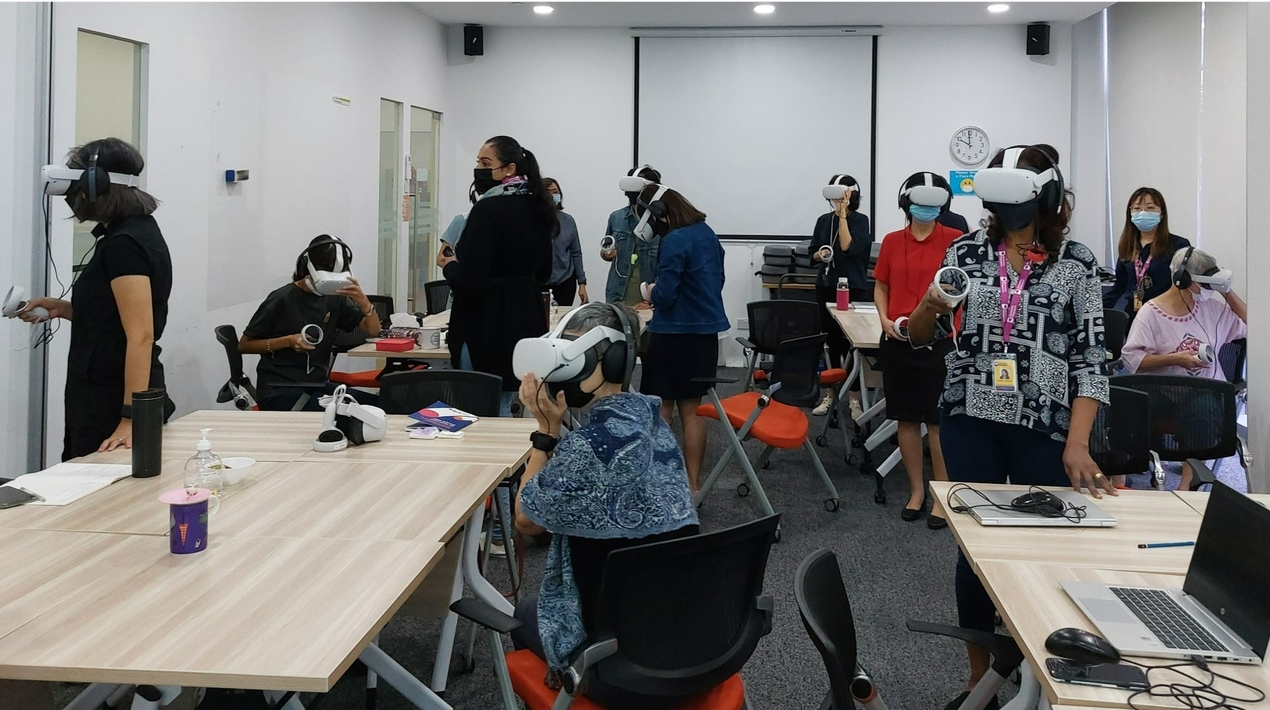
The Singapore Institute of Technology (SIT) faculty and students helped collect data from workshops to find out how well virtual reality (VR) works in the local setting. It is known as Enabling EDIE™ or Educational Dementia Immersive Experience, which simulates what it’s like to live with dementia. This has enabled Singapore to start more programmes to teach people about dementia using technology.
They helped give their expert opinion on filming the videos, using the goggles and improving the technical details to ensure the visuals are clearer and cause less motion sickness.
– Associate Professor May Lim, Director, SIT’s Centre for Learning Environment and Assessment Development
Staff from SIT’s Information and Communications Technology (ICT) cluster and CoLEAD contributed to creating these local videos and enhancing viewers’ VR headset immersion experiences. The goal is to give doctors, nurses, caregivers, and people who work in social services real-world knowledge about this debilitating disease and teach them how to respond with empathy.
SIT assisted in analysing the efficacy of VR for dementia training, and semi-structured interviews were done with the participants. Among the questions they posed were those concerning what the participants had learnt and how it affected how they care for people with dementia.
The programme provides immersive simulations within the setting of Singapore, such as scenarios of a typical Housing and Development Board (HDB) home, a day-care centre, and a grocery visit. The VR-based training gave participants a more precise awareness of how disabling dementia may be and taught them new strategies to care for their loved ones with dementia.
During the sessions, participants encountered two distinct scenarios. The first individual resides in an unsuitable residence for dementia patients, making it difficult for him to locate the bathroom. Sound manipulation creates low lighting, visual hallucinations, and sensory overload. In the second scenario, the individual is escorted to a dementia-friendly facility with suitable lighting and instructions, making going to the bathroom a more pleasant experience.
According to the study, participants’ attitudes and understanding of dementia symptoms improved significantly. This has allowed the participants to provide enhanced care and comfort to those affected by the disease.
Historically, Dementia Singapore offered experiential training with coloured glasses coated in Vaseline and loud music. To imitate the sensory experiences of people with dementia, facilitators of the programme then asked participants to complete a series of complex tasks while giving unempathetic instructions. This method demands more time and personnel for setup and effect creation than VR headsets.
VR technology gives training participants a standardised, immersive, and enhanced learning experience. It enables them to implement best practices in dementia care, including effective communication tactics and environmental change. Localised scenarios can be seen via a web application and VR headsets, making them more accessible to others who may not own them.
In addition, SIT is constantly designing activity spaces for dementia patients. According to the institute, dementia is not a disease but a collection of symptoms that can accompany other conditions. As a result, the person with dementia’s mental abilities deteriorates.
This causes memory loss, a decline in intellectual function, and personality changes. Dementia has no definitive cure because the exact causes are unknown. However, in addition to patient-centred care, medication can help reduce some more common symptoms.
Some of these symptoms can also be managed with therapies such as reality orientation and reminiscence. Occupational therapists provide daily living skills training to seniors to promote independence in the community and nursing homes for residing patients.
















